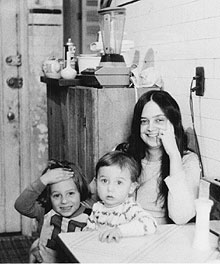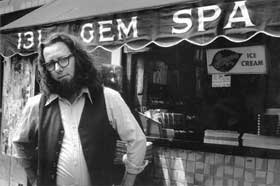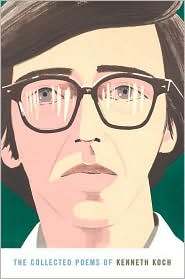Here are six potential paper topics for your final essays, which are due in class on the last day of the quarter (3/13). Your essays should be 5-7 pages in length (though feel free to go longer), double-spaced, printed in a serif font (Times New Roman, most likely) and stapled. Papers should also be written in MLA format, complete with a "works cited" page (I'll provide links for those of you who aren't familiar with MLA conventions); those which do not follow the format will be docked points. Please, please, please be sure to back up your ideas with sufficient evidence from the texts (and please cite this evidence properly). Also note that "5-7 pages" means that, at minimum, your essay makes it all the way to the bottom of the 5th page, and ideally onto a 6th page (and that doesn't count your "works cited" page). Works which do not meet the minimum length requirements will automatically receive an F.
Within the next day or so, I'll probably add one or two more topics, so if none of these strikes your fancy keep an eye out for (or suggest) an alternate topic.
1. Analyze the marriage of Ted Berrigan and Alice Notley as it’s represented through their poetry. How many different facets of their life together—both positive and negative—do they share with readers? What commonalities emerge, and in what ways do they differ in how they depict their union? How does Notley, as widow, continue this dialogue after Berrigan’s death? Be sure to include copious evidence from multiple works by both poets.
2. The “
Experiments List” (as compiled by Bernadette Mayer and Charles Bernstein) is a powerful testament to the infinite number of formulas, structures and forms by which one can express herself through poetry. Making sure not to overlap with the Mayer/Bernstein list, and drawing upon the work of some of the more experimental poets we’ve read (i.e. Ashbery, Koch, Berrigan, Notley, Mayer), make your own list of five experiments (each approximately one page long), explaining how to construct the poem (or what rules or constrictions govern it), citing examples from our readings, and discussing the overall effect of each concept. Finish with some sort of general conclusions about this approach to poetry.
3. While the New York School’s first generation was largely a male affair (with the possible exception of Barbara Guest, who was loosely affiliated), its second generation—while also including innovative male poets such as Ted Berrigan, Ron Padgett and Lewis Warsh—was largely driven by a number of powerful female voices, centered around the trio of Alice Notley, Bernadette Mayer and Anne Waldman. Explore the multifarious ways in which these three expressed a uniquely feminine perspective in their poetry, focusing on their societal role as women, as well as wives (Notley was married to Berrigan, and Waldman, then Mayer were married to Warsh) and mothers. Please aim for complex analysis, finding similarities and differences within and between each poet’s work, supported by evidence from the texts.
4. Trace the influence of a first generation member of the New York School upon a second generation member, discussing at least three techniques or characteristics passed down from the former to the latter, and providing several examples for each of these facets from the poems of each author. In what ways does the second generation poet alter or further develop the aesthetics of the first generation poet, and in what ways is he radically different from his predecessor?
5. Consider the role of humor within the poetics of the New York School, focusing on the work of several poets (O’Hara, Koch and Berrigan all jump to mind immediately). What other emotions does humor interact with in these poems? How integral is a sense of humor to each poet’s distinct style, and in what ways does it serve to further some of the central aims of the New York School (the emphasis on the personal voice, on common language, on iconoclastic and anti-academic philosophies, etc.)?
6. Ron Padgett is another important second generation member of the New York School, as a poet, translator, memoirist (of Ted Berrigan and Joe Brainard), publisher (Full Court Press), pedagogue (through the Teachers and Writers Collaborative) and, finally, as director of the St. Mark's Poetry Project in the 1970s. Read either Padgett's
New and Selected Poems (1995) or
Great Balls of Fire (1969, reissued 1990), and drawing upon a half dozen or so characteristic poems (or more, if necessary), make an argument for how Padgett's work fits within the New York School aesthetic, making comparisons to works by other poets we've read (I'd recommend limiting your scope to Ted Berrigan, his great friend and collaborator, and Kenneth Koch, his former teacher at Columbia).
 On Monday, we'll begin our unit on Bernadette Mayer, who, as we mentioned in the last class, serves as a bridge of sorts between the Second Generation New York School aesthetics, and Language poetry (or, to some, L=A=N=G=U=A=G=E poetry, after the influential journal, L=A=N=G=U=A=G=E). In her early work, especially, you'll see a far greater experimental and conceptual component than many of the folks we've read recently (and skip through some of the poems that aren't assigned to see even more esoteric works). Be sure to take a look at PennSound's Bernadette Mayer author page as well: though there aren't many recordings to go with these poems, there are a few, and Charles Bernstein's Close Listening interview with Mayer is particularly interesting. I'll post some links and other materials next week.
On Monday, we'll begin our unit on Bernadette Mayer, who, as we mentioned in the last class, serves as a bridge of sorts between the Second Generation New York School aesthetics, and Language poetry (or, to some, L=A=N=G=U=A=G=E poetry, after the influential journal, L=A=N=G=U=A=G=E). In her early work, especially, you'll see a far greater experimental and conceptual component than many of the folks we've read recently (and skip through some of the poems that aren't assigned to see even more esoteric works). Be sure to take a look at PennSound's Bernadette Mayer author page as well: though there aren't many recordings to go with these poems, there are a few, and Charles Bernstein's Close Listening interview with Mayer is particularly interesting. I'll post some links and other materials next week.






